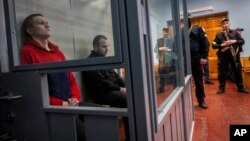The United States is a committed partner in strengthening the international justice system that seeks to advance accountability for war crimes, genocide, and crimes against humanity.
Accountability for these crimes is key to a durable peace following conflict, said U.S. Ambassador-at-Large for Global Criminal Justice Beth Van Schaack.
“The whole field of transitional justice – which embodies a mix of judicial and nonjudicial measures, formal and informal measures, and retributive and restorative justice measures – all provide a set of tools for societies emerging from armed conflict or repression to address legacies of mass violence, authoritarianism, or impunity, to comprehensively rehabilitate survivors and their communities after violence,” she said, “but also to engage in truth telling, to engage in mechanisms of nonrecurrence and other institutional reforms that will prevent a recurrence of conflict in the future.”
Ambassador Van Schaack said the United States builds partnerships with like-minded states and encourages the adoption of inclusive and comprehensive transitional justice programs in states emerging from conflict or repression:
“The last decade has seen incredible innovations in this field. The institutional framework is increasingly decentralized and multipolar. And while the International Criminal Court is an important element of this larger system, there are justice activities happening elsewhere at the domestic and international levels.”
States are taking it on themselves to adjudicate cases of international crimes in their own courts where they have jurisdiction, Ambassador Van Schaack noted. National war crimes units are increasingly coordinating among themselves to share evidence, strategies, information, and arrest operations. States have also expanded their use of sanctions and import/export regulations to hinder bad actors from perpetuating, funding, or benefiting financially from their crimes.
“Nongovernmental organizations, many of them who are funded by the U.S. State Department, have emerged as important players in these proceedings. These organizations, which are often survivor-led, are collecting and evaluating potential evidence in real time, pursuant to international standards to inform accountability processes,” she said.
“The importance of good documentation cannot be overstated, because it will undergird any justice efforts that might be underway,” said Ambassador Van Schaack.
While the international justice architecture is growing stronger, atrocities tragically keep occurring. The United States, Ambassador Van Schaack pledged, will continue to work with like-minded states, survivors, and civil society to document the crimes and forge just approaches that bring perpetrators to account.






